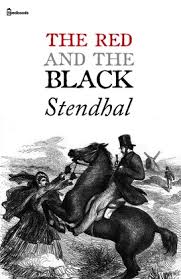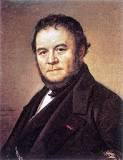The Red and the Black Page #2
Le Rouge et le Noir is a historical psychological novel in two volumes by Stendhal, published in 1830. It chronicles the attempts of a provincial young man to rise socially beyond his modest upbringing through a combination of talent, hard work, deception, and hypocrisy.
In 1822 Stendhal published his treatise, De l'Amour, a practical scientific treatise on the erotic emotion by an author who possessed the unusual advantage of being at the same time an acute psychologist and a brilliant man of the world, who could test abstract theories by concrete practice and could co-ordinate what he had felt in himself and observe in others into broad general principles. In 1825 Stendhal plunging vigorously into the controversy between the Classicists and the Romanticists, published his celebrated pamphlet, Racine and Shakespeare, in which he vindicated with successful crispness the claims of live verse against stereotyped couplets and of modern analysis against historical tradition. His next work was the Life of Rossini, whom he had known personally in Milan, while in 1827 he published his first novel Armance, which, while not equal to the author's greatest work, give none the less good promise of that analytical dash which he was subsequently to manifest. After Armance come the well-known Promenades Rome, while the Stendhalian masterpiece Le Rouge et Le Noir was presented in 1830 to an unappreciative public. Enthusiasm for this book is the infallible test of your true Stendhalian. Some critics may prefer, possibly, the more Jamesian delicacy of Armance, and others fortified by the example of Goethe may avow their predilection for The Chartreuse de Parme with all the jeune premier charm of its amiable hero. But in our view no book by Stendhal is capable of giving the reader such intellectual thrills as that work which has been adjudged to be his greatest by Balzac, by Taine, by Bourget. Certainly no other book by Stendhal than that which has conjured up Rougistes in all countries in Europe has been the object of a cult in itself. We doubt, moreover, if there is any other modern book whether by Stendhal or any one else, which has actually been learnt by heart by its devotees, who, if we may borrow the story told by M. Paul Bourget, are accustomed to challenge the authenticity of each other's knowledge by starting off with some random passage only to find it immediately taken up, as though the book had been the very Bible itself. The more personal appeal of what is perhaps the greatest romance of the intellect ever written lies in the character of Julien, its villain-hero. In view of the identification of Julien with Stendhal himself to which we have already alluded, it is only fair to state that Stendhal does not appear to have ever been a tutor in a bourgeois family, nor does history relate his ever having made any attempt at the homicide of a woman. So far, in fact, as what we may call the external physical basis of the story is concerned, the material is supplied not by the life of the author, but by the life of a young student of Besançon, of the name of Berthet, who duly expiated on the threshold that crime which supplied the plot of this immortal novel. But the soul, the brain of Julien is not Berthet but Beyle. And what indeed is the whole book if not a vindication of beylisme, if we may use the word, coined by the man himself for his own outlook on life? For the procedure of Stendhal would seem to have placed his own self in his hero's shoes, to have lived in imagination his whole life, and to have recorded his experience with a wealth of analytic detail, which in spite of some arrogance, is yet both honest and scientific. And the life of this scoundrel, this ingrate, this assassin, certainly seems to have been eminently worth living. In its line, indeed, it constitutes a veritable triumph of idealism, a positive monument of "self-help." For judged by the code of the Revolution, when the career was open to talents, the goodness or badness of a man was determined by the use he made of his opportunities. Efficiency was the supreme test of virtue, as was failure the one brand of unworthiness. And measured by these values Julien ranks high as an ethical saint. For does he not sacrifice everything to the forgiving of his character and the hammering out of his career? He is by nature nervous, he forces himself to be courageous, fighting a duel or capturing a woman, less out of thirst for blood or hunger for flesh, than because he thinks it due to his own parvenu self-respect to give himself some concrete proof on his own moral force. "Pose and affection" will sneer those enemies whom he will have to-day as assuredly as he had them in his lifetime, the smug bourgeois and Valenods of our present age. But the spirit of Julien will retort, "I made myself master of my affectation and I succeeded in my pose." And will he not have logic on his side? For what after all is pose but the pursuit of a subjective ideal, grotesque no doubt in failure, but dignified by its success. And as M. Gaultier has shown in his book on Bovarysme, is not all human progress simply the deliberate change from what one is, into what one is not yet, but what nevertheless one has a tendency to be? Viewed from this standpoint Julien's character is what one feels justified in calling a bonâ fide pose. For speaking broadly his character is two-fold, half-sensitive tenderness, half ferocious ambition, and his pose simply consists in the subordination of his softer qualities for the more effective realization of his harder. Considered on these lines Le Rouge et Le Noir stands pre-eminent in European literature as the tragedy of energy and ambition, the epic of the struggle for existence, the modern Bible of Nietzschean self-discipline. And from the sheer romantic aspect also the book has its own peculiar charm. How truly poetic, for instance, are the passages where Julien takes his own mind alone into the mountains, plots out his own fate, and symbolizes his own solitary life in the lonely circlings of a predatory hawk. Julien's enemies will no doubt taunt him with his introspection, while they point to a character distorted, so they say, by the eternal mirror of its own consciousness. Yet it should be remembered that Julien lived in an age when introspection had, so to speak, been only recently invented, and Byronism and Wertherism were the stock food of artistic temperaments. In the case of Julien, moreover, even though his own criticisms on his own acts were to some extent as important to him as the actual acts themselves, his introspection was more a strength than a weakness and never blunted the edge of his drastic action. Compare, for instance, the character of Julien with the character of Robert Greslou, the hero of Bourget's Le Disciple, and the nearest analogue to Julien in fin de siècle literature, and one will appreciate at once the difference between health and decadence, virility and hysteria.
Translation
Translate and read this book in other languages:
Select another language:
- - Select -
- 简体中文 (Chinese - Simplified)
- 繁體中文 (Chinese - Traditional)
- Español (Spanish)
- Esperanto (Esperanto)
- 日本語 (Japanese)
- Português (Portuguese)
- Deutsch (German)
- العربية (Arabic)
- Français (French)
- Русский (Russian)
- ಕನ್ನಡ (Kannada)
- 한국어 (Korean)
- עברית (Hebrew)
- Gaeilge (Irish)
- Українська (Ukrainian)
- اردو (Urdu)
- Magyar (Hungarian)
- मानक हिन्दी (Hindi)
- Indonesia (Indonesian)
- Italiano (Italian)
- தமிழ் (Tamil)
- Türkçe (Turkish)
- తెలుగు (Telugu)
- ภาษาไทย (Thai)
- Tiếng Việt (Vietnamese)
- Čeština (Czech)
- Polski (Polish)
- Bahasa Indonesia (Indonesian)
- Românește (Romanian)
- Nederlands (Dutch)
- Ελληνικά (Greek)
- Latinum (Latin)
- Svenska (Swedish)
- Dansk (Danish)
- Suomi (Finnish)
- فارسی (Persian)
- ייִדיש (Yiddish)
- հայերեն (Armenian)
- Norsk (Norwegian)
- English (English)
Citation
Use the citation below to add this book to your bibliography:
Style:MLAChicagoAPA
"The Red and the Black Books." Literature.com. STANDS4 LLC, 2024. Web. 29 Dec. 2024. <https://www.literature.com/book/the_red_and_the_black_201>.




Discuss this The Red and the Black book with the community:
Report Comment
We're doing our best to make sure our content is useful, accurate and safe.
If by any chance you spot an inappropriate comment while navigating through our website please use this form to let us know, and we'll take care of it shortly.
Attachment
You need to be logged in to favorite.
Log In